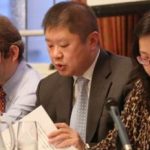 The 1st Global China Dialogue on the theme ‘the experience of China’s modernization from a comparative perspective’, was held successfully on the 17th December 2014, at the London Capital Club. Professor Xiangqun Chang, Director of CCPN Global, chaired this event (left picture). It was organized by CCPN Global and YES Global (The Young Entrepreneur Society Global) and sponsored by many institutions inside and outside China. More than 40 academics, consultants, professionals and entrepreneurs participated (right picture).
The 1st Global China Dialogue on the theme ‘the experience of China’s modernization from a comparative perspective’, was held successfully on the 17th December 2014, at the London Capital Club. Professor Xiangqun Chang, Director of CCPN Global, chaired this event (left picture). It was organized by CCPN Global and YES Global (The Young Entrepreneur Society Global) and sponsored by many institutions inside and outside China. More than 40 academics, consultants, professionals and entrepreneurs participated (right picture).
首届“全球中国对话”于2014年12月17日在伦敦伦敦金融城心脏地带的资本俱乐部(London Capital Club)举行,全球中国比较研究会会长常向群教授主持了这一活动(左图)。该活动是由全球中国比较研究会(CCPN Global)和全球青年企业家协会(YES Global)联合主办,并得到国内外多家单位的赞助,来自学术界、智库和企业的40余人应邀参加了开坛仪式(右图)。
☞ For full report please check HERE
☞ 查看报告全文,请点击 这里
☞ Video clip for the event 欢迎查看活动视频
Report in English
Minister Counsellor Xiang Xiaowei (right) gave an opening address.  He stated that during the visit of Premier Li Keqiang to Britain last June there has been a general agreement between the two governments that they will be hosting the Year of Cultural Exchange between China and the UK. There would be huge anticipation for the ‘UK Season’ in China, starting from January to June and the ‘China Season’ in the UK from July to December.
He stated that during the visit of Premier Li Keqiang to Britain last June there has been a general agreement between the two governments that they will be hosting the Year of Cultural Exchange between China and the UK. There would be huge anticipation for the ‘UK Season’ in China, starting from January to June and the ‘China Season’ in the UK from July to December.
The panellists then gave talks from global, European, Chinese, grassroots, professional and practitioners’ perspectives in turns.

Professor Martin Albrow (left) began his talk by responding to the original European idea of modernization. He said, ” the idea of ‘modern’ has undergone many changes in the course of the history of Europe, and it really takes off at a very crucial time in East-West relations, roundabout 1700, when there were these very enlightened Jesuit priests going to China and taking Western science there and bringing Chinese ethics back ”.
Mr Charles Grant(2nd left) said, “global governance is a good idea because it means that states regulate their relations through negotiation and rules rather than ‘might is right’ and invading each other but I don’t think it’s going very well; look at the World Trade Organization, created 20 years ago it’s achieved just about nothing; one set of rules recently agreed in Bali on so-called ‘Trade Facilitation’.”
Professor GUO Fengzhi (middle) believed the Chinese model is different from the Western model of modernization because “in order to realize modernization China has to pursue the domestic objective of improving its people’s quality of life, as well as resolving the external issue of being backward compared with other countries.”
Ms Xinran Xue (2nd right) worked at The Guardian and the BBC as a journalist and a writer, and founded a charity as a volunteer. Based on her working and living experiences in the UK and many countries in the world she raised three questions: (1) understanding before thinking or thinking before understanding; (2) human history is rooted, shaped or ordered by family or religion? (3) globalization or Englishlization?
Mr Philip Hao (right) also made three points: (1) ” a deeper understanding about what corporate social responsibility is something China should learn from Europe…” (2) ” The second one is about something that Europe could learn from China,……” (3) ‘ the integration between Europe and Asia particularly China is irreversible, …… ”
Professor Stephan Feuchtwang (left) Began his closing remarks by commenting on every panellists” talk only with an academic perspective, neither ‘idealistic or business-related or speak from [his] own experience except in [his] profession’…”
Feutchwang then returned to Mr Xiang’s opening address, believing that “the dialogue on modernization is inevitably going to be between different experiences of adapting whatever we mean by modernization as a project and what have been the accompanying sources of advice and the orthodoxy of the times in which that has happened”.
.jpg)
Before the floor was opened the panellists had some discussion amongst themselves. For example, Professor Xiangqun Chang introduced an empirical-study based comparative research work on academic mothers in four cities in China and the UK which found that the British mothers are always put their children at the first priority above their work.
.jpg)
During the Q & A there were many interesting questions raised, such as (1) what China can learn from pensions and social welfare from Europe…? (2) what is it about the UK that is attractive to Chinese entrepreneurs’ to come in and start a business?… (3) What are the panellists thoughts on new ideas about modernization..? (4)…
Professor Albrow made a final touch to the event. ” I think the outcome of all the academic research there’s ever been suggests that we can never understand another person or another culture completely….”

During the networking session the panellists and participants has further discussions.

Let us remember that we have been involved in the launch event for the series of ‘Global China Dialogue Forum’!

活动的中文报导
项晓炜公参(右)在开幕词中说,2014年6月李克强总理访问了英国的时候,
 英中双方同意举办中英文化交流年。根据双方协议,上半年英国在中国举办文化季,下半年中国在英国举办文化季,其活动的特点是创造性。目前我们正在和很多学术领域的有影响力学者合作,我们希望明年10月能够在伦敦举办以中国与全球现代化问题比较研究为主题的论坛。
英中双方同意举办中英文化交流年。根据双方协议,上半年英国在中国举办文化季,下半年中国在英国举办文化季,其活动的特点是创造性。目前我们正在和很多学术领域的有影响力学者合作,我们希望明年10月能够在伦敦举办以中国与全球现代化问题比较研究为主题的论坛。
接着学者专家们分别从全球、欧洲、中国、民间和企业家视野谈了他们的看法。

马丁·阿尔布劳教授(左一)首先从欧洲现代化概念的起源加以回应,他说,历史上“现代”的概念发生了很多变化,到18世纪变得更重要了,当时东西方关系已经进入一个关键性的阶段:传教士将西方科学介绍到中国,并而将中国伦理学等介绍到西方国家…从全球治理的角度上看,中国是最年轻的贡献者,中华文明正在摆脱西方的阴影,一起加入到人类的文明进程之中,共建一个普遍的全球化人类社会。
查尔斯·格兰特先生 (左二)首先坦诚地指出,虽然全球治理是一个好主意,即世界各国间的关系是按照谈判和法规规矩处理的,但是目前其况状并不好,他列举了世界贸易组织、20国集团、安理会、北约等国际组织,认为他们都是“清谈俱乐部”…
郭凤志教授(中)认为,中国的现代化对内要实现人民生活水平不断改善的目标,对外要解决在世界比较中我们相对落后问题。在经济全球化条件下中国的现代化己经置于全球化背景中,一切发展问题只能在全球背景下去思考,发展能力和发展质量也只能在世界比较中得到评价。
薛欣然女士(右二)通过对她在英国BBC和《卫报》以及创办“母爱桥”所扮演的作家、记者和志愿者的角色,以及在英国和世界许多国家的体验,就中国与英与世界国家的差异提出了三个问题:(1)“先理解再思考,还是先思考再理解”;(2)“人类历史及其秩序的根基和型塑是家庭还是宗教?”(3) “全球化还是英语国家化?“ …
郝斐先生(右一)也讲了三点,他首先倒过来说作为华人企业家,他向英国企业家学到了企业的社会责任的精神…;然后,他指出中国在互联网这个领域远远优于欧洲的原因在于中国人有努力改变自己生活方式的活力;最后,他提出,”让我们在一起,求同存异“。
王斯福教授(左)作了总结发言。他首先对上述嘉宾的发言依次作了点评,认为在马丁提出的莱布尼兹的例子上还可以加上康德关于永久和平的观点以及18世纪一批提倡全球话语和全球治理的理论家及理性主义者的观点…
王斯福重点谈了他对现代化的看法,认为事实上没有一种现代化的定义。上述问题可以一个一个地用中国与其他国家和地区的相比较,如把中国的爱国主义与英国等欧洲国家的爱国主义作比较研究也很有意义,还有城市化问题,全球货币与地方价值转化的问题,以及关于国家与社会福利民营化的过程,中国在打造与西方现代化不一样的民营化路径,这些都是很值得研究的现象。
.jpg)
在对话活动进入问答环节之前,专家学者之间对感兴趣的问题展开了一定的讨论,如常向群教授介绍了中国与英国的家庭作经验的比较研究的案例的结果:英国母亲或祖母通常是把孩子和家庭放在第一位的。
.jpg)
在对话环节开始后,与会者提出了一系列感兴趣的问题,如:中国人口老龄化之后,中国从欧洲和西方的社会福利能学到什么?与其他国家相比,为什么中国企业家更愿意到英国来创业?在现代化的进程中,中国要重视什么亚洲或中国价值,什么亚洲价值会使中国现代化放弃西方化的过程?…
马丁·阿尔布劳教授的一席话对本次对话活动作了点睛之笔,他说,从阐释社会学角度看,研究“他者”的过程是另人沮丧的,我们没办法完全相互了解…”尽量完善全球治理,尽量合作” 吧!

最后,与会者和嘉宾进一步交谈。

让我们记住本次首届“全球中国对话”活动!


